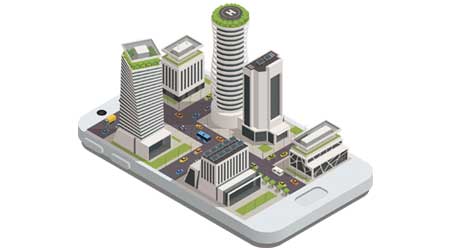Mobile Technology Offers Efficiency for FMs
Possibly more so than any other technology, going mobile has made facility staff's job easier and more efficient. Here are the benefits of mobile facility technology.
Possibly the most significant advance, in terms of its impact on facility staff, is the shift from paper and pagers to handheld tablets and smartphones. The power that facility personnel can wield in the palm of their hands today is staggering.
Access to facility and asset data, including operating procedures, building drawings, and past work order history provides technicians with the requisite information to efficiently complete the task in the field.
Barcodes, RFIDs, and talk-to-text minimize typing and allows staff to quickly create work orders in the field and accurately document the work completed, including labor and material costs.
Technicians can perform rounds and inspections, capturing data, and identifying deficiencies (failing individual tasks) that automatically generate follow-up work orders. Additionally, they should be able to view past data and related trends in the field, so that they can troubleshoot and resolve on-the-spot.
Engineers can quickly search for and request or order needed parts from the mobile device, determining availability in local stockrooms. Purchase orders could be auto-generated from the work order and routed for approval as required. The technician can then be informed once the purchase order has been approved and part has arrived, so that the maintenance can be completed.
Mobile platforms equip technicians to stay in the field, not run back and forth to a computer or office. This improves response time and communication, promotes customer satisfaction, and increases staff efficiency and utilization, which reinforces the department’s value proposition and supports its marketing strategy.
Catching up
All this technology is available and ready for facility managers to employ it; in fact, it continues to advance at breakneck speed. It is incumbent upon facility practitioners to harness this power to grow and mature the facility industry and department programs. Collectively, facility managers can advance our stature and promote facilities as a value-added partner and business-minded manager worthy of a seat at the executive table. However, it’s essential to insert a reality check: Many organizations are far from ready to jump on the technological super-highway. In those cases, the best thing to do is start with a plan; understand the organizational context and begin marketing the value that the organization will receive by adopting these advances.
John Rimer (john@fm360consulting.com), CFM, is president of FM360, LLC. In more than 20 years of facility management experience, he has implemented and managed facility programs for companies such as Intel, Microsoft, JP Morgan Chase, and Charles Schwab and has worked in numerous sectors, including corporate campus, high tech, data centers, bio-tech/pharmaceutical, higher education, K-12, healthcare, manufacturing, municipalities, state, and federal.
Related Topics:











